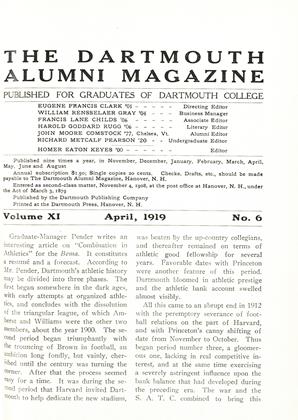The MAGAZINE is in receipt of the following announcement relative to the annual prizes offered by Messrs. Hart, Schaffner, and Marx for studies in the economic field:
"In order to arouse an interest in the study of topics relating to commerce and industry, and to stimulate those who have a college training to consider the problems of a business career, a committee composed of: Professor J. Laurence Laughlin, University of Chicago, Chairman; Professor J. B. Clark, Columbia University; Professor Henry C. Adams, University of Michigan; Hon. Theodore E. Burton, New York City, and Professor Edwin F. Gay, Harvard University, has been enabled, through the generosity of Messrs. Hart, Schaffner & Marx of Chicago, to offer in 1920 four prizes for the best studies in the economic field.
"In addition to the subjects printed below, a list of available subjects proposed in past years has been issued. Attention is expressly called to the rule that a competitor is not confined to topics proposed in the announcements of this committee, but any other subject chosen must first be approved by it.
1. On what economic basis can a League of Nations be permanently established?
2. The Future of the Food Supply.
3. A study of the means and results of economic control by the Allies during the European War.
4. The effects of governmental action in the United States on the wages of labor.
S. The effect of price-fixing in the United States on the competitive system.
6. A study of the effects of paper money issues during the European War.
"Class B includes only those who, at the time the papers are sent in, are undergraduates of any American college. Class A includes any other Americans without restriction ; the possession of a degree is not required of any contestant in this class, nor is any age limit set.
"A first prize of one thousand dollars and a second prize of five hundred dollars, are offered to contestants in Class A.
"A first prize of three hundred dollars, and a second prize of two hundred dollars, are offered to contestants in Class B. The committee reserves to itself the right to ward the two prizes of $1,000 and $500 of Class A to undergraduates in Class B, if the merits of the papers demand it. The committee also reserves the privilege of dividing the prizes offered, if justice can be best obtained thereby. The winner of a prize shall not receive the amount designated until he has prepared his manuscript for the printer to the satisfaction of the committee.
"The ownership of the copyright of successful studies will vest in the donors, and it is expected that, without precluding the use of these papers as theses for higher degrees, they will cause them to be issued in some permanent form.
Competitors are advised that the studies should be thorough, expressed in good English, and although not limited as to length, they should not be needlessly expanded. They should be inscribed with an assumed name, the class in which they are presented, and accompanied by a sealed envelope giving the real name and address of the competitor.
No paper is eligible which shall have been printed or published in a form to disclose the identity of the author before the award shall have been made. If the competitor is in CLASS B, the sealed envelope should contain the name of the institution in which he is studying. The papers should be sent on or before June 1, 1920, to
Esq. The University of Chicago Chicago, Illinois.
 View Full Issue
View Full Issue
More From This Issue
-
 Article
ArticleMILITARY NEWS
April 1919 -
 Article
ArticleANNUAL MEETING OF THE DARTMOUTH SECRETARIES ASSOCIATION
April 1919 -
 Class Notes
Class NotesCLASS OF 1899
April 1919 By George G. Clark -
 Article
ArticleMORNING SESSION
April 1919 -
 Article
ArticleDINNER SESSION
April 1919 -
 Article
ArticleGraduate-Manager Pender writes an interesting article on "Combination in Athletics" for the Bema.
April 1919








